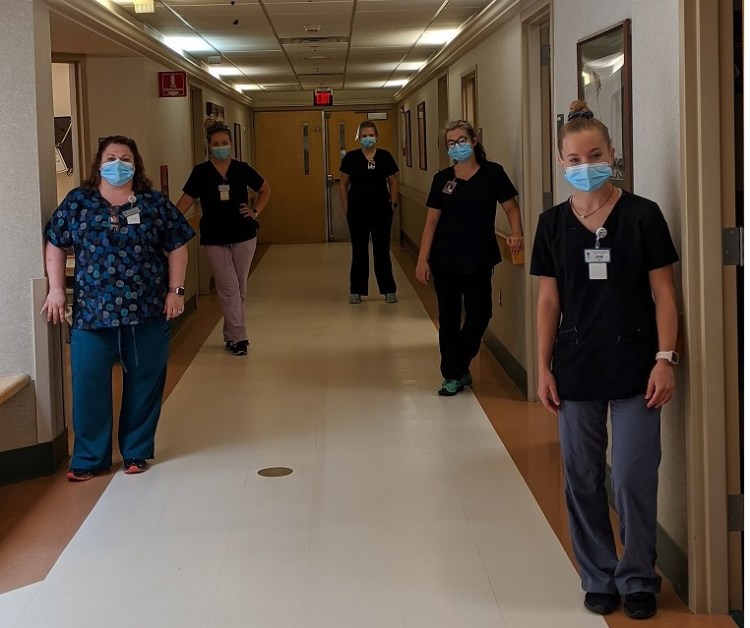
Clinical Instructor Mandy Tuttle with a medical mannequin from Augusta Adult Education. Tuttle was able to take an empty resident room at Maine Veterans’ Homes — Augusta and turn it into a training area for students. Photo courtesy of Maine Veterans’ Homes — Augusta
COVID-19 has caused many challenges, but it has also brought people together to lend a helping hand when needed. Maine Veterans’ Homes — Augusta did just that when it assisted area CNA students complete the training hours they needed to be able to help others, according to a news release from Molly Lovell-Keely, communications and stewardship coordinator at the Augusta home.
“The state is in critical need of health care workers right now,” said Mandy Tuttle, RN and clinical instructor at MVH Augusta.
Training Begins at Home
The need for healthcare workers was also vital before the pandemic, which is why Tuttle and MVH Augusta started working in January to launch its first-ever Certified Nursing Assistant course offered through the Home. Overseen by Augusta Adult Education, the first class started April 13 and unfortunately, COVID-19 threatened its progress. Labs that were supposed to take place at Cony High School were on hold, so Tuttle contracted with Augusta Adult Education to use their medical mannequin.
The pandemic didn’t affect the work/school life of two students enrolled in the course because they were already employees at the Cony Road home; they had been hired as unit helpers before the course started where they performed such tasks as delivering trays, making beds, spending time with residents and other assignments that don’t require credentialing.
“It helps them get acquainted with the residents and operations of the Home,” Tuttle said.
Helping Others

Capital Area Technical Center student Caroline Brown practices donning and doffing (putting on and taking off) Personal Protective Equipment. Photo courtesy of Maine Veterans’ Home — Augusta
The nearby Capital Area Technical Center found itself in a jam, however. The high school juniors and seniors in its CNA course had completed most of their classwork, but they had clinical hours that needed to be logged in order to take the state’s CNA exam.
“Because this was an issue that affected schools everywhere, the state changed the number of clinical hours it required to take the test from 70 to 45. That still left students short, though as they still needed to find a way to complete a total of 70 clinical hours,” Tuttle said.
MVH Augusta and CATC were already familiar because MVH Augusta is one of the places students perform clinicals during school, so officials from both organizations put their heads together to figure out how they could help these students get into the workforce.
MVH Welcomes Students
The MVH Augusta program that started in April pays students while they train and in return, the student agrees to commit to work at the home for a set period once they’re certified. These guidelines were forgone, however, for CATC students in an effort to help get them trained as efficiently as possible.
“The understanding was that they would finish their hours here and not get paid. They wore their CATC uniform and badge, but the only difference was that I was the supervising nurse,” Tuttle said, adding that she spoke to each student over the phone before they agreed to serve their hours at MVH Augusta to go over guidelines for working during the pandemic.
“It was important that they let us know if they had a job. In order to keep residents safe, we had to ensure that they wouldn’t be working anywhere else where they could become exposed to COVID-19,” Tuttle said.
“In addition, all students who were currently working, before performing their hours at MVH Augusta, had to quarantine for two weeks at home,” she added.
The MVH Way
Maine Veterans’ Homes, which operates six homes throughout the state, offers care for veterans, their spouses, widows and widowers, and Gold Star parents. Tuttle said she emphasized to CATC students the utmost importance of caring for the home’s veterans, how much they mean to the staff and how critical it is to take the necessary precautions to keep them safe from COVID-19.
“I think it was something that made them think, ‘Gee, I really want to work for a place that cares for their residents like that,’” Tuttle said, adding that three CATC students so far have turned in applications to work at MVH Augusta once their training is completed and they pass the CNA exam.
To learn more about joining MVH Augusta’s next CNA course, contact Amy F. Deslauriers, recruiter, at amydeslauriers@MaineVets.org or 207-620-3009.
Comments are not available on this story.
Send questions/comments to the editors.


